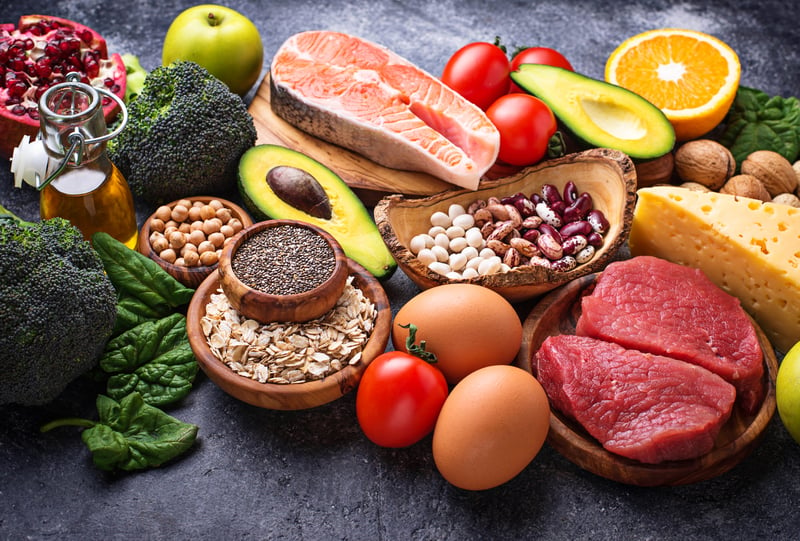Are you in your 40s and feeling frustrated by the extra pounds that seem to cling to your body despite your efforts? You're not alone. Weight loss can be more challenging as we age, especially for adults above 40. But fear not, because understanding the unique factors at play and making informed choices can lead to successful weight management.
Why is weight loss more challenging after 40?
As you age, your metabolism slows down, making it easier to gain weight and harder to lose it. This metabolic shift is part of the natural ageing process, affecting both women (menopause) and men (andropause). Both involve the gradual decline in hormone levels, which can lead to a decrease in muscle mass and an increase in fat storage, albeit in different ways:
- Fertility: Menopause signifies the end of ovulation and menstruation, while male menopause does not signal the end of reproductive capability.
- Onset: Perimenopause can start between 36-45 and can last up to 10 years. Menopause begins around age 50, while andropause can start as early as the late 40s.
- Hormonal impact: Menopause involves a significant decrease in oestrogen levels, whereas andropause is characterised by a gradual decline in testosterone levels.
- Symptoms: Perimenopause symptoms include weight gain and an increase in body fat. Menopause symptoms often include hot flashes and night sweats, while andropause symptoms may include fatigue, reduced libido, and mood swings.
How these factors affect your weight loss program
Traditional weight-loss programs may not be as effective for adults above 40 due to these metabolic changes. Crash diets and intense workouts can be unsustainable and may even be harmful, leading to muscle loss and metabolic slowdown.
It’s important to understand that what worked for you before 40 may not work after 40. Instead, a more holistic approach that addresses hormonal balance, muscle preservation, and lifestyle factors is essential for long-term success.
So, what's the recommended approach? It's about adopting a balanced and sustainable lifestyle that focuses on 5 key lifestyle areas:
- Nutrition.
- Physical activity.
- Restorative sleep.
- Stress management.
- Avoiding risky substances.
Dietary considerations

As you age, your nutritional needs may change, and it's essential to correctly fuel your body for optimal health and weight management. Include plenty of fruits, vegetables, lean proteins, whole grains, and healthy fats in your diet. Avoid processed foods, sugary snacks, and excessive alcohol consumption (see “Avoid risky substances below), as they can contribute to weight gain and hinder your progress.
Recommended strategies:
- Increase or maintain an adequate intake of lean protein. Aim for at least 1.5-2 grams of protein per kilogram of body weight daily. This will help retain muscle mass.
- Incorporate more calcium-rich foods, such as dairy products. Aim for 1,000–1,200 milligrams daily. This will help maintain bone health.
- Consider following the Mediterranean-style diet, which incorporates whole, unprocessed foods and prioritises healthy fats, lean proteins, and abundant fruits and vegetables.
- Don't demonise carbohydrates, they're the body's preferred source of energy. Consume moderate amounts to help maintain energy levels - do not exclude them.
Exercise recommendations

Regular physical activity is crucial for weight loss and overall health, especially as hormone levels decline with age.
Aim for a combination of higher-intensity cardiovascular exercise and strength training to improve fitness, boost metabolism, and maintain muscle mass. Prioritise activities you enjoy and make them a regular part of your routine, whether that’s working out individually or as a group, indoors or outdoors, etc.
Recommended strategies:
- Prioritise high-intensity interval training (HIIT) and sprinting when participating in cardiovascular training. This will help decrease the risk of cardiovascular disease and help target visceral fat (the fat around your abdomen and organs).
- Prioritise strength training and plyometrics (explosive movements) when participating in muscular training. This will help maintain muscle mass, improve muscle contraction, and safeguard bone health.
- Aim for 1–2 cardiovascular training sessions, 2–3 muscular training sessions, and 1 plyometric training session weekly to achieve optimal results. Plan for this to be a long-term commitment, not an unsustainable fad.
Sleep quality

Quality sleep is essential for overall health and weight management. Lack of sleep can disrupt hormone levels, increase appetite, and reduce metabolism, making it harder to lose weight.
Recommended strategies:
- Aim to get at least 7 hours of uninterrupted sleep each night and establish a regular sleep schedule to support your weight-loss efforts.
- Reduce caffeine intake, particularly in the late afternoon and evening hours.
Stress management
Chronic stress can negatively impact weight loss efforts by increasing cortisol levels, which can lead to cravings, overeating, and weight gain, particularly around the abdomen (visceral fat). Practice stress-reducing techniques such as meditation, deep breathing, yoga, or time spent outdoors to promote relaxation.
Recommended strategies:
- Practise stress-reduction activities, such as relaxation exercises, mindfulness, and finding positive outlets for stress.
- Avoid overtraining and prioritise rest and recovery between moderate-to-vigorous training sessions.
Avoid risky substances
It may go without saying, but when your body is undergoing so much change, it's best to avoid or moderate the intake of risky substances that could worsen your weight-loss efforts.
Recommended strategies:
- Avoid tobacco and non-prescription drugs.
- While heavily moderating your alcohol intake is recommended, a small amount now and again may be beneficial. This has been shown to activate a parasympathetic response in your nervous system, which can lead to a temporary reduction in stress and anxiety.
How we can help
We understand the unique challenges of weight loss after 40, and we're here to support you every step of the way. While it may require a different approach than when you were younger, it’s entirely possible.
By understanding the factors at play, making informed choices, and seeking support from experienced and qualified professionals, you can achieve lasting success and enjoy improved health for years to come.
Our team have worked with numerous clients aged 40 and above, helping them achieve their weight loss goals through personalised programs tailored to their specific needs. From comprehensive fitness assessments to customised nutrition plans, and even stress management classes, we provide the guidance and accountability you need to succeed.
Don't let age be a barrier to your goals – take charge of your health and start your journey to a happier and healthier you.


.png?width=301&height=187&name=Website%20Navigation%20Images%20(3).png)

-1.jpg?width=1984&height=1196&name=UFIT%20Club%20Street%20Front%20(4)-1.jpg)






